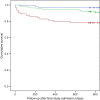Risk of death following admission to a UK hospital with diabetic ketoacidosis
- PMID: 27397023
- PMCID: PMC5016550
- DOI: 10.1007/s00125-016-4034-0
Risk of death following admission to a UK hospital with diabetic ketoacidosis
Abstract
Aims/hypothesis: The aim of this study was to assess the risk of death during hospital admission for diabetic ketoacidosis (DKA) and, subsequently, following discharge. In addition, we aimed to characterise the risk factors for multiple presentations with DKA.
Methods: We conducted a retrospective cohort study of all DKA admissions between 2007 and 2012 at a university teaching hospital. All patients with type 1 diabetes who were admitted with DKA (628 admissions of 298 individuals) were identified by discharge coding. Clinical, biochemical and mortality data were obtained from electronic patient records and national databases. Follow-up continued until the end of 2014.
Results: Compared with patients with a single DKA admission, those with recurrent DKA (more than five episodes) were diagnosed with diabetes at an earlier age (median 14 [interquartile range 9-23] vs 24 [16-34] years, p < 0.001), had higher levels of social deprivation (p = 0.005) and higher HbA1c values (103 [89-108] vs 79 [66-96] mmol/mol; 11.6% [10.3-12.0%] vs 9.4% [8.2-10.9%], p < 0.001), and tended to be younger (25 [22-36] vs 31 [23-42] years, p = 0.079). Antidepressant use was greater in those with recurrent DKA compared with those with a single episode (47.5% vs 12.6%, p = 0.001). The inpatient DKA mortality rate was no greater than 0.16%. A single episode of DKA was associated with a 5.2% risk of death (4.1 [2.8-6.0] years of follow-up) compared with 23.4% in those with recurrent DKA admissions (2.4 [2.0-3.8] years of follow-up) (HR 6.18, p = 0.001).
Conclusions/interpretation: Recurrent DKA is associated with substantial mortality, particularly among young, socially disadvantaged adults with very high HbA1c levels.
Keywords: Deprivation; Diabetes; Diabetic ketoacidosis; HbA1c; Mortality; Type 1 diabetes.
Conflict of interest statement
Funding This research received no specific grant from any funding agency in the public, commercial or not-for-profit sectors. Duality of interest statement The authors declare that there is no duality of interest associated with this manuscript. Contribution statement FWG and KAL conceived this study with subsequent input from WLT and JG in developing study design and contributing to data collection and analysis. FWG wrote the initial draft of the manuscript with revisions provided from all authors. The final manuscript was approved by all authors. FWG is the guarantor of this work.
Figures
Comment in
-
Diabetes: Recurrent DKA - for whom the bell tolls.Nat Rev Endocrinol. 2016 Oct;12(10):562-4. doi: 10.1038/nrendo.2016.137. Epub 2016 Aug 26. Nat Rev Endocrinol. 2016. PMID: 27564715 No abstract available.
Similar articles
-
Predictors and outcomes of recurrent diabetic ketoacidosis in Israeli adults.Diabetes Metab Syndr. 2021 Sep-Oct;15(5):102276. doi: 10.1016/j.dsx.2021.102276. Epub 2021 Sep 3. Diabetes Metab Syndr. 2021. PMID: 34509792
-
Mortality after discharge from hospital following an episode of diabetic ketoacidosis.Acta Diabetol. 2022 Nov;59(11):1485-1492. doi: 10.1007/s00592-022-01953-5. Epub 2022 Aug 11. Acta Diabetol. 2022. PMID: 35951132
-
Diabetic Ketoacidosis at Onset of Type 1 Diabetes and Long-term HbA1c in 7,961 Children and Young Adults in the Australasian Diabetes Data Network.Diabetes Care. 2022 Dec 1;45(12):2918-2925. doi: 10.2337/dc22-0853. Diabetes Care. 2022. PMID: 36749868
-
Recurrent diabetic ketoacidosis and a brief history of brittle diabetes research: contemporary and past evidence in diabetic ketoacidosis research including mortality, mental health and prevention.Diabet Med. 2019 Nov;36(11):1329-1335. doi: 10.1111/dme.14109. Epub 2019 Aug 29. Diabet Med. 2019. PMID: 31418474 Review.
-
Recurrent diabetic ketoacidosis.Arch Endocrinol Metab. 2019 Jul 29;63(5):531-535. doi: 10.20945/2359-3997000000158. eCollection 2019. Arch Endocrinol Metab. 2019. PMID: 31365631 Free PMC article. Review.
Cited by
-
Disparities in Care Delivery and Outcomes in Young Adults With Diabetes.Curr Diab Rep. 2018 Jul 14;18(9):65. doi: 10.1007/s11892-018-1037-x. Curr Diab Rep. 2018. PMID: 30008025 Review.
-
Successful management of severe diabetic ketoacidosis in a patient with type 2 diabetes with insulin allergy: a case report.BMC Endocr Disord. 2019 Nov 11;19(1):121. doi: 10.1186/s12902-019-0451-7. BMC Endocr Disord. 2019. PMID: 31711488 Free PMC article.
-
Protocol for a feasibility study and process evaluation of a psychosocially modelled diabetes education programme for young people with type 1 diabetes: the Youth Empowerment Skills (YES) programme.BMJ Open. 2022 Jun 9;12(6):e062971. doi: 10.1136/bmjopen-2022-062971. BMJ Open. 2022. PMID: 35680254 Free PMC article.
-
Diabetic Ketoacidosis in Children and Adolescents; Diagnostic and Therapeutic Pitfalls.Diagnostics (Basel). 2023 Aug 4;13(15):2602. doi: 10.3390/diagnostics13152602. Diagnostics (Basel). 2023. PMID: 37568965 Free PMC article. Review.
-
The relationship between diabetic ketoacidosis and suicidal or self-injurious behaviour: A systematic review.J Clin Transl Endocrinol. 2023 Sep 29;34:100325. doi: 10.1016/j.jcte.2023.100325. eCollection 2023 Dec. J Clin Transl Endocrinol. 2023. PMID: 37840692 Free PMC article. Review.
References
-
- Wright J, Ruck K, Rabbitts R, et al. Diabetic ketoacidosis (DKA) in Birmingham, UK, 2000–2009: an evaluation of risk factors for recurrence and mortality. Br J Diabetes Vasc Dis. 2009;9:278–282. doi: 10.1177/1474651409353248. - DOI
MeSH terms
Substances
LinkOut - more resources
Full Text Sources
Other Literature Sources


